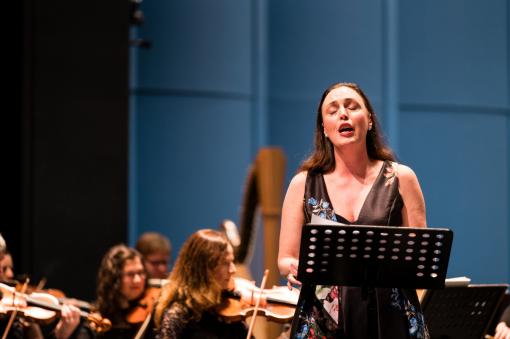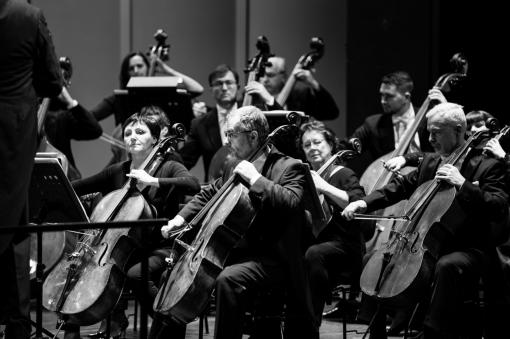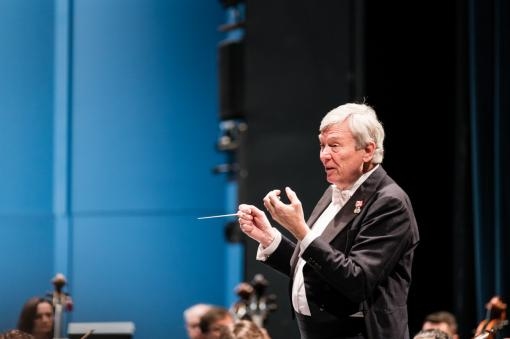Drama, philosophy, and an interestingly outlined psychology of works was offered up by the most recent big concert of the Brno Philharmonic at the Janáček Theatre. The listener-friendly programme, aptly titled Ancient Nordic Tales, was staged and performed with the orchestra by Danish conductor Michael Schønwandt (*1953), currently chief conductor of the Orchestra of the National Opera Montpellier. His fondness for promoting contemporary composers is reflected in the dramaturgy itself. In addition to well-known works by Edvard Grieg and Jean Sibelius, the audience had the opportunity to get acquainted with Danish composer Hans Abrahamsen (*1952). American soprano Nicole Chevalier also introduced her works to the audience.
The stage version of Norwegian playwright and poet Henrik Ibsen’s dramatic poem Peer Gynt is rightly one of the most performed works of his compatriot Edvard Grieg, but the piece is rarely performed in its original version. Much more often, the two orchestral suites are performed to be heard, and their uniqueness has led them from the theatre to the concert hall. Schønwandt, together with the Philharmonic, chose five notorious movements from the two suites. In the first, Morning Mood, the atmosphere is enhanced by solos from the transverse flutes and oboes. The question remains whether the interesting interpretation was the conductor’s wish or the invention of the players themselves. The solos, detailed in expression and phrasing, were often rhythmically unconvincing, yet they imaginatively illustrated the playfulness and naivety inherent in the subject matter itself. The overall faster pace, while refreshing, was at times detrimental to the overall interplay. The work with dynamics and colour was very novel, especially in the string section, which also appeared in the next movement, The Death of Åse. The often extremely weak intensity of the pianos and pianissimos gave the piece musical drive. Anitra’s Dance to the rhythm of the mazurka provided a contrast to the previous two pieces. The dancing and the imaginary push-off were adversely affected in terms of instrumental-articulation and in the overall sense of tempo. The first violin in particular tended to speed up and overtake the rest of the orchestra. This eventually calmed down in the movement In the Hall of the Mountain King, where on the other hand the uniform pizzicato and the work with accents and precise phrasing of the main motif should be noted. Grieg’s work concluded with the fourth movement from the second suite, Solveig’s Song, in which the singer Nicole Chevalier was introduced to the audience for the first time. Apart from a few negligible intonational inaccuracies, it was very interesting to perceive the musical and expressive conception of this soprano, who portrayed the motif of waiting in a very sophisticated way not only with her singing but also with her facial expressions.
Hans Abrahamsen’s demanding song cycle Let Me Tell You for soprano and orchestra was a dramaturgical and musical leap of faith. The text of the novella of the same name by the publicist, librettist, and writer Paul Griffiths describes the heroine Ophelia from Shakespeare’s drama Hamlet. She is not portrayed as a poor woman, however, but as a confident, perceptive woman. The composition was originally written at the instigation of Canadian soprano Barbara Hannigan, who also gave the premiere performance with the Berlin Philharmonic under the baton of Andris Nelsons. Chevalier’s interpretation was somewhat darker in colour and expression than we may know from Barbara Hannigan. The singer portrayed the psychology of the work, especially that of the protagonist, excellently, with an occasional more expressive vibrato and velvety poise. The enunciation was debatable, often coming across as overdone. This did make the singer easy to understand, however, despite the fact that some syllables or words deviated from the usual pronunciation of the English language. Compositionally and technically, there were critical points in the piece – major or minor seconds (sounding like quarter tones), high positions in unison in various instrumental combinations, and pizzicato deliberately written in a rhythmically “fuzzy” way. In these exposed places, then, it might have seemed to the listener that the orchestra and the singer were at odds and making rhythmic or intonational errors, when this in fact was the composer’s intention. Even so, a few reservations about the performance can be formulated. Throughout the piece one could feel and hear that the players were not overly familiar with Abrahamsen’s musical language, and this was certainly evident in many areas. The work was also challenging in terms of its construction. The last text I Will Go Out Now from the third movement of the cycle is also the longest section. The conclusion gave a kind of never-ending impression. In the conductor’s attempt to bring the whole phrase carefully to a close and really let all the dynamic parts fade away to nothing, the very end of the piece seemed unattainable after the long built-up conclusion.

Symphony No. 5 in E flat major, Op. 82 by Jean Sibelius was to be the intended highlight of the evening. The Brno Philharmonic Orchestra, however, simply performed just another piece. Perhaps the players were exhausted after the first half of the programme, or maybe they devoted less effort to this composition. The orchestra transformed into a boat on a stormy sea, constantly looking for stability. The three-movement symphony is based on alternating varied tempos, dance rhythms, and contrasting surfaces. Apart from a few bright moments, such as the sonically dense romantic string surfaces or the fairly homogeneous pizzicatos, the rest of the piece was unfortunately marked by rhythmic incongruity, especially in the individual transitions between tempos. In the symphony, articulation and concreteness disappeared from the players, so that the individual surfaces merged and seemed monotonous in expression. This, of course, made the piece suffer overall. Especially at the end of the whole concert, it was a great pity that the drama and musical drive that had been felt in the previous compositions had completely dissipated.

I completely understand the dramaturgical intention to leave Sibelius’ work to the finale, but I can rather imagine hearing it in the first half of the evening and closing the concert with the more familiar Peer Gynt. Probably a selection from the suites would have worked better as a climax than the aforementioned symphony.
Edvard Grieg: Peer Gynt, selection from suites
No. 1 Op. 46
Morning Mood (Allegretto pastorale)
The Death of Åse (Andante doloroso)
Anitra’s Dance (Tempo di mazurka)
In the Hall of the Mountain King (Alla marcia e molto marcato)
No. 2 Op. 55
4. Solveig’s Song (Andante – Allegretto tranquillamente)
Hans Abrahamsen: Let Me Tell You for soprano and orchestra
Jean Sibelius: Symphony No. 5 in E flat major, Op. 82
Nicole Chevalier: soprano
Brno Philharmonic Orchestra
Michael Schønwandt: conductor

































No comment added yet..